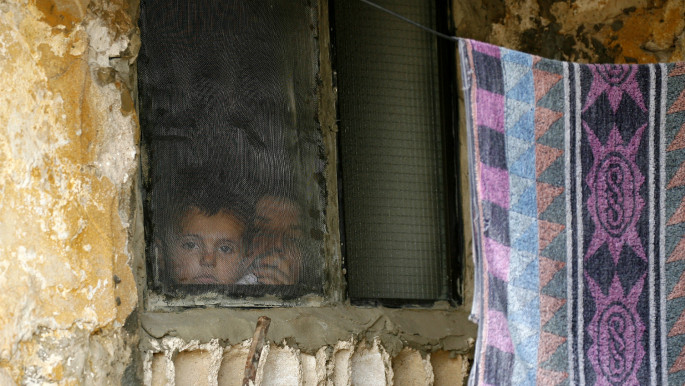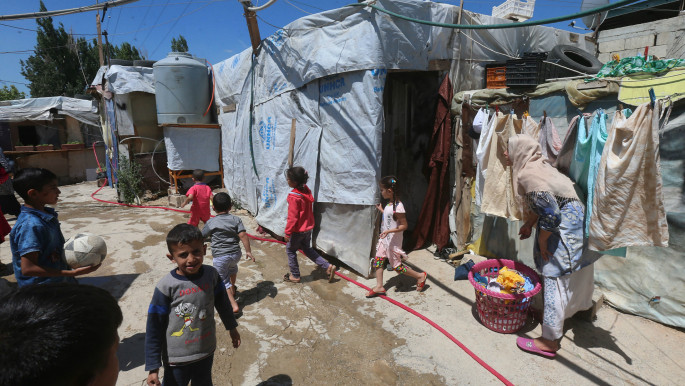Lebanese security forces crackdown on Syrians as pressure builds on refugees to return
On one Thursday earlier this month, shopkeepers sat waiting apprehensively by the few Syrian-owned stores that were still open, and even though some were joking among themselves, the mood was palpably tense.
"The stores are closed; human rights are closed," one Syrian small business owner told The New Arab, eliciting nervous laughter from the other shopkeepers around him.
Since late October, Syrian shopkeepers in Sidon, Tyre, and in other parts of southern Lebanon have been closing their businesses under pressure from Lebanon's General Security Directorate, which has started to rigorously enforce laws restricting Syrian refugee employment in the region for the first time.
Although both local and national leaders said this crackdown was a matter of adherence to Lebanese law that was bound to happen sooner or later, Syrian workers and public policy experts alike told The New Arab that the moves were clearly intended to push refugees in the area to return to Syria.
"They took [Syrian refugees'] ID cards and telephones, and their papers were sent to General Security," a Lebanese furniture owner in Sidon's industrial district told The New Arab via a WhatsApp audio message. "When will they return them? If they close their shops."
 |
They take your things, take your money, in a very bad and inhuman way |  |
A local journalist with connections in Sidon's Syrian community described the treatment Syrian workers received.
"Everyone, every shop, that had an employee or worker, per person, [had to pay] 1 million liras [about $666] or had forty-eight hours to pack their things and to stop work," he told The New Arab. "They take your things, take your money, in a very bad and inhuman way."
A Syrian shopkeeper from Tyre stated that he had also seen similar patrols taking place in that city. He and all the Syrians The New Arab spoke with asked that their names not be published, fearing repercussions from authorities.
 |
|
| Over one million Syrian refugees had been registered in Lebanon in 2016 [Getty] |
Lebanon's Minister of Economy and Trade Raed Khoury confirmed to The New Arab that the campaign against Syrian shops owners in Lebanon's south is part of a wide-ranging effort by the Economy Ministry.
While in the past national policies restricting Syrian refugees were often carried out by municipalities, Kamel Kozbar, a member of the Sidon municipal government, denied that the city had any involvement in the latest crackdown.
Instead, for the first time, the national government has deployed the General Security Directorate, which already handles voluntary Syrian refugee returns from Lebanon, to enforce laws on Syrians' employment by challenging their work permit and residency status.
 |
Syrians are still only allowed to work in certain sectors like construction and agriculture, and have to go through the often-difficult process of obtaining permits if they wish to enter other industries |  |
"This is definitely the first time they have used it during the last eight years of the Syrian crisis... I don't recall it ever being used before," said Nasser Yassin, the director of research at the Issam Fares Institute for Public Policy and International Affairs at the American University. "So it's a bit of a new development."
But this is certainly not the first time that Syrians have been forced to close their businesses in Lebanon. According to The Daily Star, the Labour Ministry issued an order in early 2017 aimed at cracking down on Syrian shops, limiting Syrian employment, and eliminating unregistered enterprises in order to protect Lebanese workers and businesses.
Lebanese laws on Syrian refugee employment have shifted over the years, but legally, Syrians are still only allowed to work in certain sectors like construction and agriculture, and have to go through the often-difficult process of obtaining permits if they wish to enter other industries.
"Around 73 percent of the refugees in Lebanon don't have legal residency papers," Yassin said, adding that refugees need legal residency in order to obtain work permits. "Almost all of the Syrians in Lebanon don't have work permits."
 |
|
| Read also: Syrian refugees in Lebanon weigh the risks of returning against the risks of staying |
Yet the enforcement of these restrictions has been lax for years, and Syrian refugees have long been able to work illegally in small businesses without permits – much to the chagrin of many Lebanese merchants, who have long claimed that the 1.5 million Syrian refugees in Lebanon have introduced unfair competition into its labour market.
"We have to safeguard some businesses for the Lebanese," Lebanon's caretaker Minister of State for Displaced Affairs Mouin Merehbi told The New Arab. "There are some laws that they have to abide by," the minister added, despite noting that he is sympathetic to the Syrians' situation.
But Yassin told The New Arab that Lebanon's south has the largest proportion of Syrian refugees who do possess residency papers and are eligible for work permits.
In addition, he noted that Syrians are not the only ones working under the table in Lebanon, and that more than 50 percent of all workers in Lebanon, including native Lebanese, work in the informal economy.
"The decision of the General Security to be strict on employing Syrians is in the direction of encouraging people and pushing them to return [to Syria]," he stated. "I don't see it any other way."
So far, at least two former merchants in Sidon have already made plans to go back to Syria as a result of the closures, and one of them told The New Arab that he knows he is likely to face criminal charges upon his return.
Syrians in Lebanon have long faced explicit efforts aimed at getting them to leave, including laws that have made it more difficult for them to renew residency permits, evictions by municipalities, and harassment by local residents throughout the country.
A large share of these campaigns is fuelled by economic tensions – just last week, demonstrators in two towns in the Tyre area burned tires in protest of Syrian labor competition. Additionally, Hizballah has recently begun facilitating returns to Syria as well, but have also done so by force – the militant group, which is allied with Syrian President Bashar al-Assad, reportedly arrested fifteen Syrians in Lebanon and returned them to Syria earlier this month.
The UNHCR, which tracks both self-organised returns as well as those organised by General Security, continues to support only a "safe and dignified return" process for Syrians, and the Lebanese government has also pledged its commitment to making sure returns are voluntary.
But Merehbi stated that ultimately, Syrians must be prepared to make some difficult choices.
"Unfortunately, unfortunately, they have to decide between their dignity, sometimes, and their lives," he said, addressing those refugees who may be going back to unfavourable conditions in their homeland – conditions that may not necessarily meet the criteria set out by UNHCR.
By all measures, campaigns to repatriate Syrian refugees back to their homeland have ramped up over the last year in Lebanon. Yet these latest developments are a sign that the Lebanese government, its security forces, and national political parties are growing more forceful in pressuring refugees to return, even if refugees must do so in less-than-secure and voluntary circumstances.
Michal Kranz is a freelance journalist based in Beirut, covering everything from US national security to refugee issues in Lebanon.
Follow him on Twitter: @Michal_Kranz





 Follow the Middle East's top stories in English at The New Arab on Google News
Follow the Middle East's top stories in English at The New Arab on Google News


